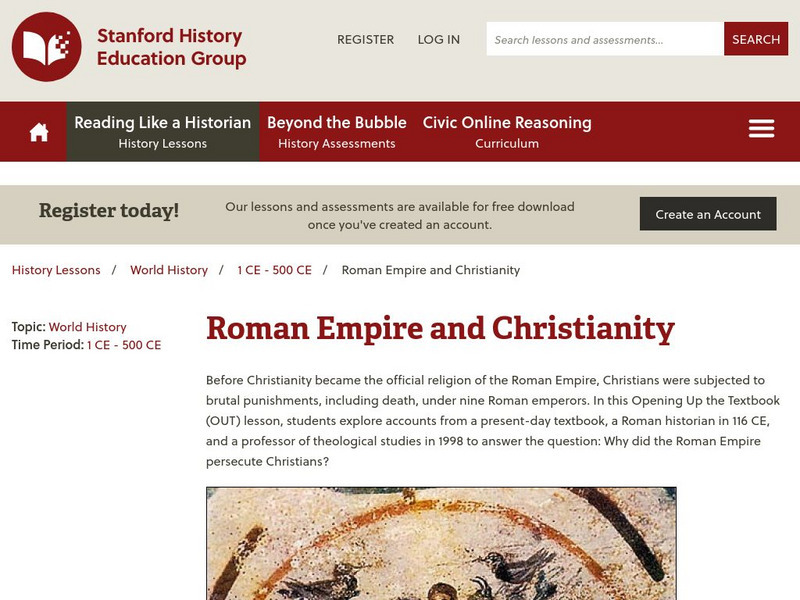Curated OER
The Great Debate--Hellenism, Judaism, and Luke 10:27
Young scholars work in teams to establish the viewpoint of Biblical characters and debate aspects of the Hellenistic view versus the views of the Christian and Jewish people. In this Hellenism and Judaism lesson plan, students...
Facing History and Ourselves
We and They, the Armenians in the Ottoman Empire
Learners examine World War I war crimes. For this world history instructional activity, students use primary and secondary sources to research and understand the action taken by the United States during the Armenian Genocide. Learners...
Curated OER
Secrets of the Parthenon
Students take a closer look at the Parthenon. In this world monument lesson, students watch PBS video segments about the reconstruction of the Parthenon in Greece. Students research how the ancient Greeks built the structure and discuss...
University of Florida
Language Change
The English language is complex and sometimes counterintuitive. Guide young grammarians through a brief overview of the history of the English language with a presentation that includes lecture notes.
Curated OER
Charlemagne
In this Christianity worksheet, learners read a 1-page selection about Charlemagne as well as Internet articles about him and then respond to 11 short answer questions.
Curated OER
The Impact of Islamic Culture on the Arts of the Renaissance
Eighth graders examine the linguistic and cultural impact of the Arabic language and Islamic culture on the Spanish language. They analyze and label maps, listen to and differentiate between Spanish and Arabic music, and compare and...
Curated OER
Hellenistic World
In this Classical period learning exercise, students read over 2 pages of notes about Hellenistic culture and then highlight the important details.
Curated OER
Ancient Civilizations
Students examine the institutions and values of various ancient civilizations. They define civilization, read and discuss text, write journal entries, list the characteristics of a powerful society, and write a description of an event.
Curated OER
Guidelines for Governing: Utopia and The Prince
Young scholars explore the power of the Church in government. In this literature lesson plan, students read Sir Thomas More's Utopia and Niccolo Machiavelli's The Prince. Young scholars respond to questions regarding the works and...
National First Ladies' Library
Why Do We Have Libraries?
Students investigate the reason and origins of libraries and conduct an information search using a variety of resources. They are divided into groups that have a specific set of questions they are to answer. Each group will then complete...
Curated OER
The Feudal System: Castles at War
Young scholars study the feudal system of the Middle Ages. In this Middle Ages lesson, students watch "The Feudal System at War". Young scholars listen to an instructor-delivered lecture regarding the roles of monarchs, nobles, knights,...
Curated OER
Europe in the Middle Ages
Students focus on the development of European civilization during the Middle Ages in Europe through this series of lessons. They develop an awareness for time and place, explain the complex nature of cultures, and real and mythical...
Curated OER
The Turks, Istanbul, & Constantinople
In this "The Turks, Istanbul, and Constantinople" history study guide worksheet, students read a brief overview pertaining to the topic and then respond to 3 reflection questions.
Curated OER
Olympics (World Celebrations)
Students recognize the meanings and symbolism of the Olympic Flag and Torch and apply this to their own feelings of the classroom by creating their own symbol/flag to represent these feelings.
Curated OER
On a Pilgrimage
Sixth graders engage in a variety of learning experiences surrounding the study of the Middle Ages. They construct a map of Europe, create a graphic organizer for the hierarchy of feudalism, design their own family crest, and write their...
Curated OER
What is Halloween?
In this Halloween worksheet, students listen to a description of the origins of Halloween. Students answer fifteen questions related to the history. One worksheet has the story and questions. Another worksheet just list the questions...
Curated OER
The Mythical, Magical, Middle Ages...NOT!
Students complete worksheets and roleplay feudal simulations as they are immersed in the daily life of the Middle Ages. They study geography of Europe and the origins of European tribes. They outline and write a biographical essay and...
Curated OER
Valentine's Day
Students create a flower, poem, and mailbox for someone to open on Valentine's Day. In this Valentine's Day lesson plan, students also write Valentine letters.
Curated OER
The Story of St. Valentine
In this reading comprehension learning exercise, students read the story about St. Valentine. Students then answer 9 reading comprehension and grammar questions about the text.
Curated OER
St. Augustine's Confessions by St. Augustine
In this online interactive reading comprehension worksheet, students respond to 13 multiple choice questions based on St. Augustine's Confessions. Students may submit their answers to be scored.
Curated OER
Germany : 1500-present
In this German history study guide worksheet, students read a brief overview pertaining to the history of Germany from 1500 to the present.
Stanford University
Stanford History Education Group: Roman Empire and Christianity
[Free Registration/Login Required] Lesson in which students investigate several sources to determine why the Roman Empire persecuted Christians. Inlcudes downloadable lesson plan, PowerPoint, original documents, teacher and student...
Other
Edward Goldsmith: The Fall of the Roman Empire
This excerpt from chapter 1 of author Edward Goldsmith's book The Great U-Turn points out the reasons for the decline and fall of the Western Roman Empire. He reasons that the invasion of various people groups, foreign influences, the...
Khan Academy
Khan Academy: Greco Roman
Instead of rule by a single person, Athens and Rome developed governments with widespread participation by male elites, which lasted about 170 years in Athens and about 480 years in Rome. This article discusses the rise of the Greek and...























